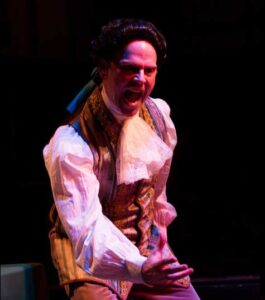Solemn and Unusual: 1776 at Toby’s
Posted on BroadwayWorld.com May 18, 2015
There are times it’s hard to credit that 1776 is even a musical. In this retelling of the drafting and signing of the Declaration of Independence, there is some singing and some dancing, and there are even some laughs, but little effort to follow the tried-and-true path to rousing musical success. This is fundamentally a tale of a group of men sitting in a room debating, and Peter Stone, author of the book, gives us – a group of men sitting in a room debating. With only twelve songs in the show, there is one half-hour stretch which features no music at all. What romance may be found lies between John and Abigail Adams (sung across some space of open stage to underline that it is purely epistolary), and between Thomas and Martha Jefferson – both couples already married. None of that falling-in-love stuff here. The first-act closing number is a stark, melancholy and ghostly evocation of the horrors of war that echoes attitudes toward Vietnam when the show originated. The finale, which in almost any other musical would involve the entire cast singing, is simply one voice speaking the names of the signers as they step forward to execute the Declaration, as the sound of bells gradually drowns out the speaker. And yet the work has considerable power and appeal, and it is not strange either that it won the Tony for Best Musical in 1969, or that Toby’s has revived it.
Though 1776 takes massive liberties with the historical record, it gets the central fact right: a roomful of men struggling through the summer heat, and through disagreement and compromise, to forge a document of eloquence and unimaginable consequence. The uplifting solemnity of the event is preserved, and indeed it would be hard to imagine a more appropriate way of concluding it than with the tolling bells already mentioned.
Toby’s brings its customary high performance standards to this revival, including a number of its seasoned veterans (Lawrence B. Munsey, David Bosley-Reynolds, Robert John Biedermann 125, Jeffrey Shankle, and Marykate Brouillet among them) in the ensemble, all of them troupers who could do musical comedy in their sleep. Standouts include Daniel Felton as Edward Rutledge (pictured above), who gets to sing one of the spookiest songs ever to grace (if that’s the word) a musical: Molasses to Rum, an almost incoherently evil paean to slavery, and Matthew Hirsch, as a courier from General Washington who delivers the previously-mentioned evocation of war’s horrors, Momma Look Sharp.
My only criticism is that to all appearances, Toby’s has substituted a recorded score for a live orchestra on this occasion, and, apart from a certain lack of spontaneity, there were moments when performers and orchestra were a half-beat or so out of synch. That did not happen much, but it was noticeable when it did. On a related note, however, Toby’s sound design (by Mark Smedley) was crisper and clearer than I have heard it (under another designer) in recent performances.
In any event, the show, underattended the night I was there, is a fine evening of theater, and, because of, not despite, all the palaver, it is especially worthwhile to take youngsters to. I had a fifth-grader with me, and he was goggle-eyed at the debate and the bell-ringing conclusion. Never underestimate the theatrical impact of ideas and of ideals. You should go.
Copyright (c) Jack L. B. Gohn, except for production photo. Photo credit: Jeri Tidwell.


 I lived in London and Vienna before coming to the United States, and grew up mainly in Ann Arbor. I was writing plays and stories as early as grade school. My undergraduate years at the University of Pennsylvania, where I first reviewed theater, for the college paper, were succeeded by graduate study at the Johns Hopkins University, where I earned a doctorate in English Literature.
I lived in London and Vienna before coming to the United States, and grew up mainly in Ann Arbor. I was writing plays and stories as early as grade school. My undergraduate years at the University of Pennsylvania, where I first reviewed theater, for the college paper, were succeeded by graduate study at the Johns Hopkins University, where I earned a doctorate in English Literature.